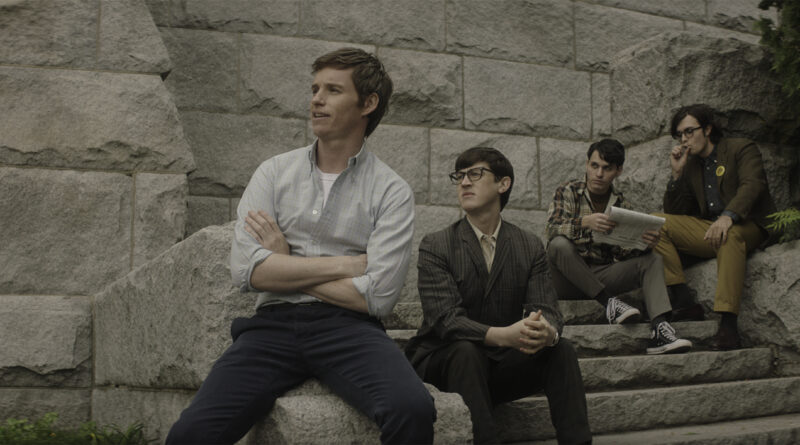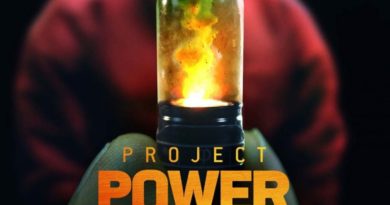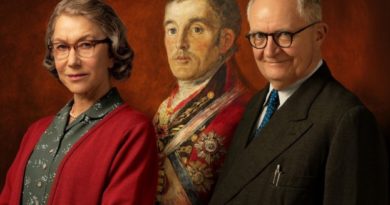Eddie Redmayne, Sacha Baron Cohen and Jeremy Strong star in The Trial The Chicago 7
“He was a clown who was deeply passionate,” says Baron Cohen. “I think he said that the modern revolutionary should head straight to the television station. There’s no way that a group of hippies are going to win against the National Guard and police and armed vehicles.
The only way they can win is by winning over the American public and the only way to do that is to get in front of the cameras.”
Echoing Sorkin, Baron Cohen goes on to describe how the script, years after he’d first read it, found its moment again. “Somehow this script has grown into the time period, or the time period has meant that the script is suddenly more powerful. I just thought it was completely captivating.”
Baron Cohen not only did extensive research into Hoffman’s life, but also worked to perfect the activist’s distinctive Boston accent. “I read a lot of Hoffman’s transcripts and was blown away by his intelligence. But the first thing I had to learn was the accent, which hopefully I got away with. It’s bloody hard.”
During the trial, like several of the other defendants, Hoffman helped pay for his defence by speaking at college campuses. “It was a gift from the gods that these guys, and especially Abbie, would go to colleges and perform sold-out shows,” says Sorkin.
“So I knew from time to time I could cut to Abbie and it would be really fun narration. Sacha just hit it out of the park.
Jeremy Strong
Emmy Award nominee Jeremy Strong, who was cast to play Jerry Rubin, Hoffman’s fellow Yippie on trial, describes another similarity between Hoffman and Baron Cohen.
“Abbie was a real sort of histrionic, colorful, vivid, sort of larger-than-life guy, who was also the most serious guy in the room,” says Strong. “And Sacha is, too. He’s a really incredibly smart man who’s very active politically in the world and does a lot of advocacy and charity work. It’s a wonderful confluence of an actor and a character.”
I can’t think of anyone else who could play Abbie Hoffman.”
Strong, best known for his standout role in HBO’s Succession, took on the character of Jerry Rubin with equal enthusiasm. “I wanted nothing more in the world than to be a part of this film,” says Strong, who had previously appeared in Aaron Sorkin’s Molly’s Game. “I read this script for the first time, I think, in 2013 and I remember being completely blown away by it. Aaron’s of course one of our greatest writers, and it’s the story of our time.”
According to Producer Stuart Besser, Jeremy Strong is a performer who wholeheartedly transforms into the person he’s playing. “He dives in 100%,” says Besser. “He has wonderful ideas and he really gets into whatever character he is.”
Jerry Rubin was a University of California at Berkeley dropout who, like Hoffman, began as an activist in support of civil rights for African Americans. “In this story, Jerry really is the militant,” Strong explains. “He started out in Berkeley, laying down in front of troop trains, stopping them from going to Oakland.”
But, according to Strong, like most of the other defendants in the trial, Rubin had a pretty typical American upbringing. “These guys all came out of middle class homes,” he says. “They kind of rejected the middle class mores they saw in the country and wanted to kind of drop out, drop out of the culture.”
Strong goes on to describe the Chicago 7 as young men with deeply held beliefs who felt a “moral imperative to go to the Democratic Convention in 1968 and stage a demonstration.
Abbie and Jerry — their goal was to have a festival of life in opposition to what was called the festival of death happening down at the convention.” Rubin, like Hoffman, was also keenly aware of the power of publicity. “They were the longhaired, tie-dyed, drop out, turn-on people,” says Sorkin. “They had an enormous following. They were rock stars in their day.”
“They marketed themselves before marketing yourself was a thing,” Besser agrees. “If they were around today they would have had 10 million followers on Twitter.”
In contrast, Tom Hayden and Rennie Davis’s approach in the antiwar movement as leaders of the Students for a Democratic Society (SDS) was more pragmatic than that of the Yippies.
Eddie Redmayne
When Academy Award winner Eddie Redmayne first read Sorkin’s script, the actor was far from home and under the weather. “I was in Morocco on holiday, I had food poisoning, and I had ruptured my foot so I couldn’t leave the hotel,” he tells it. “I was feeling so miserable and sorry for myself when this email pinged through with a script from Aaron Sorkin.
“Quite often as an actor you’re asked what is your bucket list, what character do you want to play, who do you dream of working with,” Redmayne continues. “There was only one person on my bucket list and that was Aaron Sorkin. It was by far the most thrilling, funny, enlightening, and emotional piece of writing that I’d ever read. I finished it and called up my agent and said, ‘count me in, in whatever capacity.’”
When he learned he’d been asked to portray Tom Hayden, the leader of the SDS who later became a respected California senator, Redmayne delved into researching a man and a period of American history he had known little about. “Tom Hayden was an extraordinary man,”
Redmayne learned. “He was born in Michigan and had a rebellious spirit from an early age. He was a Freedom Rider and went to New Jersey to work with people in the African American community. He was incredibly vocal.
He was incredibly literate and wrote a lot. He joined the fledgling SDS in the ’60s and was one of the main authors of the Port Huron statement, which was about finding a new shift in liberal thoughts and politics.”
Once he educated himself about Hayden, Redmayne hewed closely to Sorkin’s script. “Whenever you play someone real, you go and do all that research and then you kind of throw it away,” says Redmayne.
Sorkin himself encouraged the actor not to feel pressure to exactly duplicate the real Hayden in his portrayal. “Aaron was very strong to liberate me early as I was working on my voice, and Tom had a very specific voice,” Redmayne tells it.
“Aaron said I don’t want this to be a replica of Tom Hayden. I want you to play my version of him.”
Redmayne goes on to describe his character. “Within the context of this film and this story, Hayden wanted to work within the system,” the actor tells it.
“He believed in democracy. He believed that the people in charge were rotten, but he believed in the system.”




